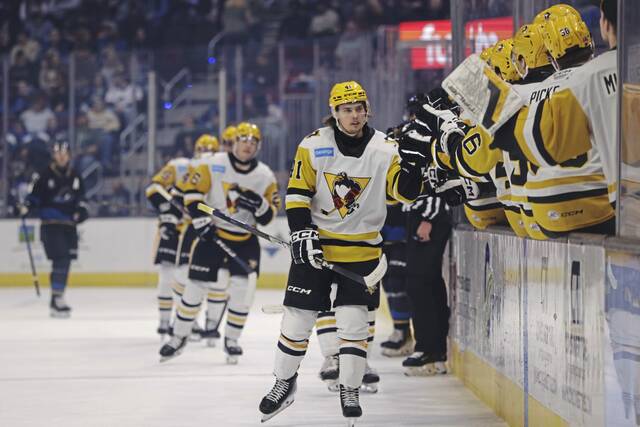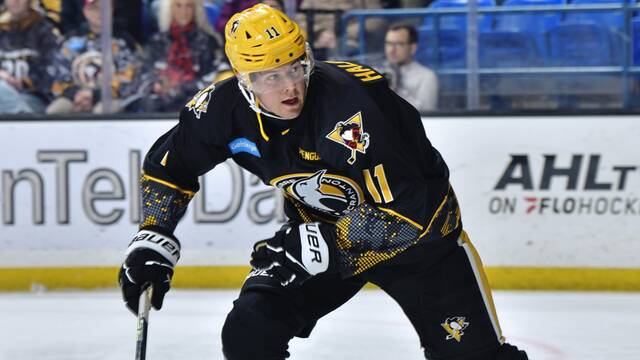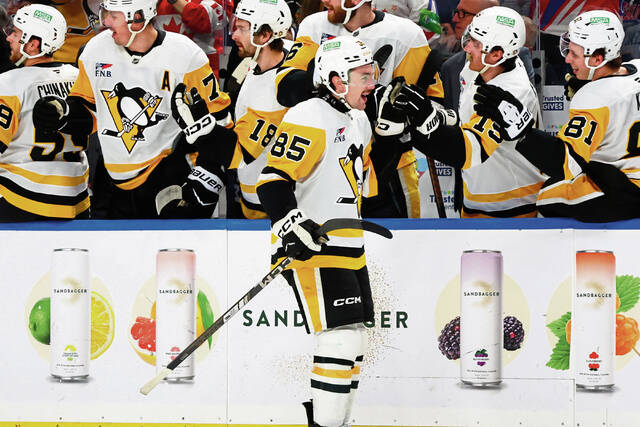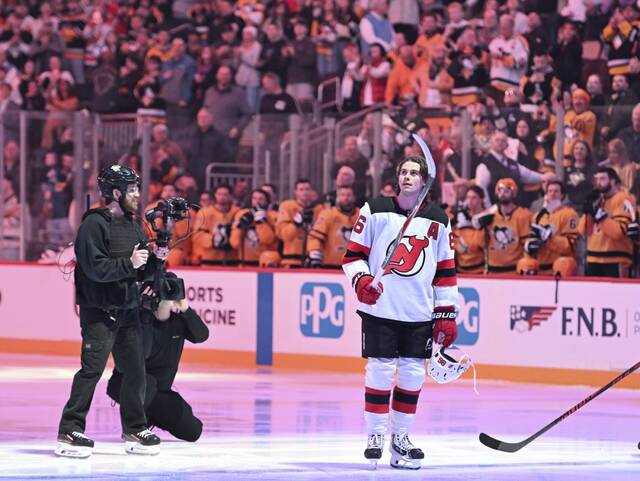The answer always seems to be the same.
But the questions remain.
“Anything new?”
“Not really. I don’t know what I’m allowed to say.”
That typically has been the exchange between reporters and Pittsburgh Penguins center Teddy Blueger for the past month and change.
In the paranoid realm of the NHL, any information related to health matters is treated like a code that would disarm a nuclear warhead. As a result, most players — typically not adverse to blocking frozen pucks traveling at speeds approaching those on Germany’s Autobahn — treat queries about their wellbeing with the same bravery typically applied to handling a radioactive diaper.
At the moment, all that is known, publicly at least, is that Blueger is on long-term injured reserve because of an undisclosed injury he suffered in a practice session during training camp Sept. 28. Aside from two preseason contests, Blueger has yet to appear in a game this season.
Long-term injured reserve — which allows teams to temporarily relieve themselves of a player’s salary cap — requires players to be under that designation for 10 of his team’s games as well as 24 days on the NHL calendar. Blueger has more than exceeded those thresholds as he was eligible to be removed Nov. 5.
But for the Penguins, who entered the season with only $83,158 of salary cap space according to Cap Friendly, dealing with various injuries and illnesses since then, they’ve needed to keep Blueger, who carries a $2.2 million salary cap hit, on long-term injured reserve in order to recall the likes of forwards Drake Caggiula, Filip Hallander, Sam Poulin and Drew O’Connor and defenseman Mark Friedman from Wilkes-Barre/Scranton of the American Hockey League over the past three weeks.
With the exception of Hallander, who is dealing with an undisclosed illness, the bulk of the Penguins’ roster appears to be fully healthy.
Including Blueger.
On Monday in Cranberry (and the past handful of weeks), he practiced in a full capacity with no limits on contact. In fact, he served as the team’s second-line center in place of Evgeni Malkin, who was excused to attend to a personal matter.
Coach Mike Sullivan rarely offers much in the way of substance on injuries, but he did pull back the curtain a little — very little — when asked about Blueger’s status following Monday’s practice.
“It’s a good question,” Sullivan said. “Right now, Teddy’s at the point where it’s reactionary, day to day, depending on how he responds to the different stimulus that we give him, whether it be in the weight room or on the ice. We’ll take the advice of our medical staff. When he gets cleared to play, then we’ll try to put him in a position to be successful. He has been a full participant in practice. He looks really good out there. His status will remain the same.”
Whenever Blueger is ready to play again, it will be a welcome return to a team that has had trouble with its penalty kill throughout the season and defending leads, particularly in recent games.
Last season, Blueger led the Penguins with 130 short-handed faceoffs taken and was second on the squad with 360 defensive-zone faceoffs in all situations despite being limited to 65 games because of various ailments.
Suffice it to say, the team’s defensive interests involve Blueger to a heavy degree.
Through Sunday’s games, the Penguins were 23rd in the 32-team NHL on the penalty kill with a conversion rate of 75.5%.
“Obviously, he’s been a staple on the (penalty kill) for a while,” said forward Bryan Rust, an occasional member of the penalty kill. “The first guy over the board winning faceoffs, that’s a key and really important part of the (penalty) kill is winning faceoffs. He’s a guy who’s seen it all, can kind of make those reads on the fly and help other guys out.”
And just in terms of overall defense, their four most recent losses have involved surrendering leads, including three in the third period.
“He means a lot,” said forward Brock McGinn, Blueger’s most regular linemate last season with 501 minutes, 52 seconds of common five-on-five ice time, according to Natural Stat Trick. “His work ethic, his positivity out there, just the way he works at both ends of the rink and what he brings to our (penalty) kill is huge. It will be nice to get him back when he gets back.”








